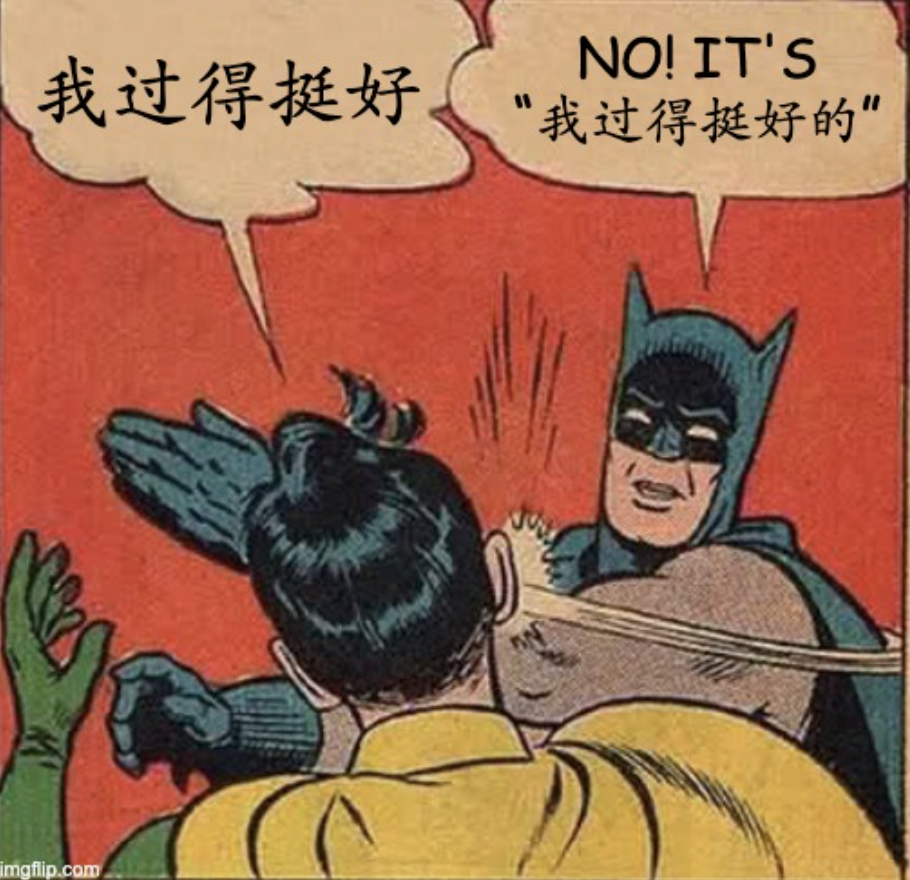Not quite sure which "quite" to use? We’ve got you! || 蛮 vs 挺
Note: If you are new to characters or generally want some support while working through the example sentences in the next sections, we HIGHLY recommend downloading this plugin! It will help a ton with character reading, both in this article, and on the greater web in general. If you’ve already installed it, carry on! :)
If you’re a native English speaker, you may know that certain words, phrases, ways of speaking are used for different social contexts. For example, you probably won’t say “yo whatup” when greeting your boss unless you work for a Bay Area startup; that just isn’t very appropriate for the situation 😕
Instead, you would use a synonym that sounds more polite, such as “hello” 👍
Key takeaway: Connotation is important, not just literal meaning!
This dynamic is present throughout Chinese too, and will help us understand the difference between “蛮” and “挺”.
Well then, what’s the connotation (or 含义 - literally “contained meaning”) of these two words, and when is it best to use each one? Let’s find out! 🧐
TLDR
Both 蛮 and 挺 can be literally translated as “quite”; however:
蛮 is typically used in colloquial, informal settings
挺 is typically used in more formal settings and in writing
Think 蛮 + adj —> “pretty adj”, 挺 + adj —> “quite adj”
蛮
蛮 can be translated in English as “quite ___”. However, it has a more informal connotation and is typically only used in casual, spoken settings, so a better translation can be “pretty ___”.
After all, you tend to say “pretty good” when you’re talking to your friends casually, not “quite good”, right?
Here are some examples:
At the bar with friends: 你的这个星期过得怎么样?哎呀,工作蛮忙的,现在我终于能休息一下!
How was your week? Aiya, work was pretty busy, now I can finally relax!
Discussing movies to watch tonight: 这个你看看,看起来蛮有意思。
Look at this movie, it looks pretty interesting
*Note that when using 蛮 as an adverb, it is optional to attach the character 的 after the adjective. In my personal experience, I have heard 的 being both omitted and included.
蛮, whose traditional form is 蠻, originally referred to non-Han Chinese ethnic groups located in present-day China, and it had a derogatory connotation of “barbarian, barbarous”. Its current most predominant use as meaning “pretty” is “quite” a far jump from its original meaning.
*FunFact: 蛮’s original meaning is still seen today with certain words formed using this character, such as “野蛮“, meaning “uncivilized, barbarous”.
**Another FunFact: 蛮 referring originally to barbarians and later also meaning barbarous is similar to how the Greeks referred to non-Greek speaking peoples as “barbaroi”, which later became “barbarians” and led to the adjective “barbarous”!
挺
挺 also can be translated in English as “quite”. It has a more formal connotation than 蛮, and so an appropriate translation can also be “rather”.
挺 tends to be used in both spoken and written settings, though again, typically more so in formal contexts.
Here are some examples:
Dinner with your boss: 感谢你认真的工作!因为你好好工作,我们今年的利润挺好的。
Thank you for your earnest work! Because you worked so diligently, our profits this year were rather good.
Company meeting: 我们的消费增加得挺快的。
Our expenses are increasing rather quickly.
*Note that when using 挺 as an adverb, you must attach 的 after the adjective!
挺 is written the same way in both Simplified and Traditional Chinese, and in addition to meaning “quite”, it can also mean “to stick out”. The meaning comes from the 手 radical on the left, while the sound comes from the 廷 (ting2) radical on the right.
If you think about it, going from meaning “to stick out” to “quite” makes sense. After all, isn’t something that’s “quite good” something that sticks out to you more than other mediocre things?
To Conclude
Both 蛮 and 挺 can be translated as “quite”.
However, the connotations of these words are different and so…
A better translation of 蛮 is “pretty”
A better translation of 挺 is “rather”
Here’s another key takeaway for your future Chinese studies in general: 含义 is important! Words that may have the same literal meanings may have different connotations and so be used in different situations; always be careful to use the right words in the right social settings! If you do this, you’ll be one step closer to having Chinese that’s 挺好的. ☺️
Ready to practice your connotation skills? Try out this 蛮 vs 挺 quiz!


